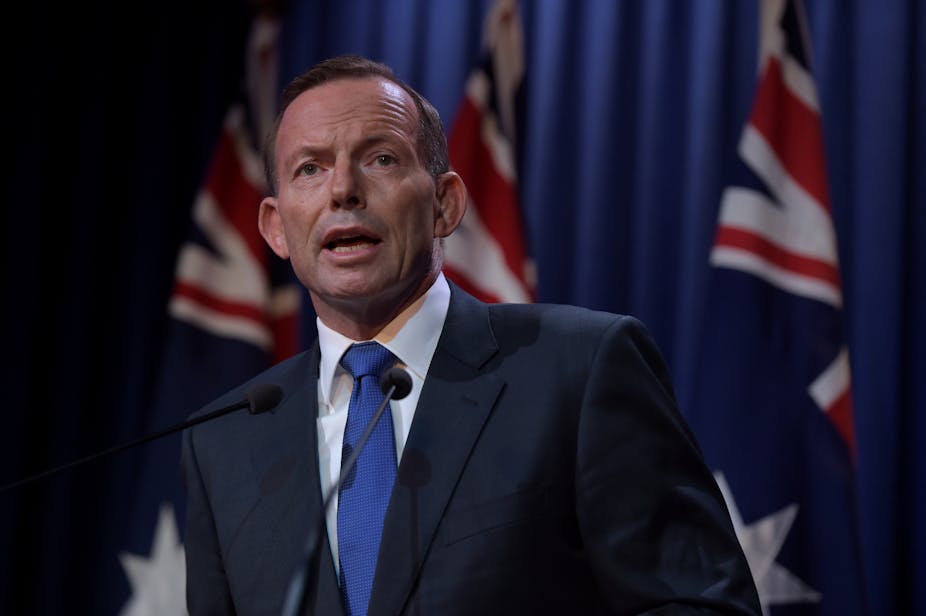Tony Abbott has urged Muslim leaders to speak out more – and sincerely – in the fight against terrorism, as he unveiled tough new measures that would remove or curb the citizenship rights of those linked to terrorist activity.
Delivering his national security statement, Abbott said: “I’ve often heard Western leaders describe Islam as a ‘religion of peace’. I wish more Muslim leaders would say that more often, and mean it.”
Abbott said the government would act against “hate preachers” – by enforcing its strengthened terrorism advocacy laws, running programs to challenge terrorist propaganda and provide alternative online material based on Australians values, and bringing in stronger prohibitions on vilifying, intimidating or inciting hatred.
“These changes should empower community members to directly challenge terrorist propaganda,” Abbott said.
“Everybody, including Muslim community leaders, needs to speak up clearly because, no matter what the grievance, violence against innocents must surely be a blasphemy against all religion.”
The government would clamp down on organisations that incite religious or racial hatred. “No-one should make excuses for Islamist fanatics in the Middle East or their imitators here in Australia,” Abbott said. “Organisations and individuals blatantly spreading discord and division – such as Hizb ut-Tahrir – should not do so with impunity.” He did not say the government would seek to ban Hizb ut-Tahrir.
The government will amend the Citizenship Act to enable it to revoke or suspend the Australian citizenship of dual nationals involved with terrorism.
“It has long been the case that people who fight against Australia forfeit their citizenship. Australians who take up arms with terrorist groups … have sided against their country and should be treated accordingly.”
For those with only Australian citizenship, the government is examining suspending some of “the privileges of citizenship”. These could include restricting their ability to leave or return to Australia, their access to consular services overseas, and their access to welfare payments.
“We cannot allow bad people to use our good nature against us,” Abbott said in his speech, which was delivered not to parliament but at the Australian Federal Police Headquarters in Canberra.
Abbott said no one should live in Australia “while denying our values and rejecting the very idea of a free and open society”.
Over recent months he had spent many hours listening to Australians from all walks of life. “People are anxious about the national security threats we face. Many are angry because all too often the threat comes from someone who has enjoyed the hospitality and generosity of the Australian people,” Abbott said.
On the balance between liberty and protection, Abbott said: “We will never sacrifice our freedoms in order to defend them – but we will not let our enemies exploit our decency either.
"If Immigration and Border Protection faces a choice to let in or keep out people with security questions over them – we should choose to keep them out.
"If there is a choice between latitude for suspects or more powers to police and security agencies – more often, we should choose to support our agencies.
"And if we can stop hate preachers from grooming gullible young people for terrorism, we should.”
Opposition leader Bill Shorten, who has taken a bipartisan approach on security, pledged to “engage constructively” with the government, saying the measures Abbott proposed deserved full and careful consideration.
Shorten said there always should be a strong presumption in favour of individual liberty. “This presumption should only be reduced, rebutted or offset to the extent that current arrangements are proven to be inadequate.”
Asked about Abbott’s call for Muslim leaders to speak up more, Shorten said the frontline in dealing with terrorism was the Muslim community. Periodically, it had been Australian Muslims speaking up, working with police and security agencies who had provided great assistance in dealing with extremists.
“I wouldn’t want to do anything which sends a message to all those brave people. To all those community-minded people, to all those great Australians that somehow their contribution is less welcome or less valued – because it is welcome and it is valued.”
A government review of Australia’s anti-terrorism machinery, released by Abbott, says Australia’s online counter radicalisation efforts are largely passive, based on government-badged information.
“Community leaders and young Muslim Australians are often seen by at-risk communities as more credible,” it says, Government should build the capacity of these credible voices to increase their reach and effectiveness. This might include funding for multimedia training and the development of online forums and videos.
The review, which pointed to a rising threat of terrorism in Australia, said the security agencies should be quarantined from the government’s efficiency dividend.

